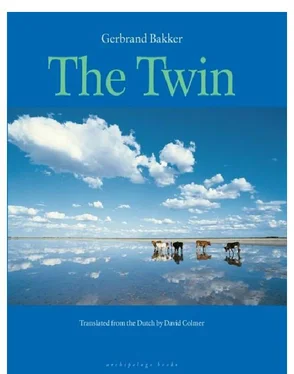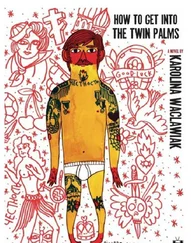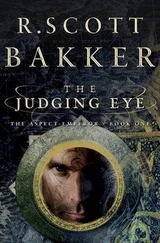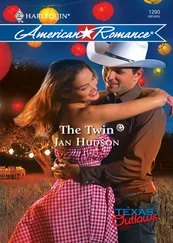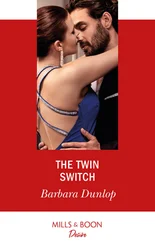“This is it,” I say.
“Uh-huh,” says Henk.
I put the car in the barn out of the rain. Without looking around, he lifts his pack off the back seat.
“Clothes?” I ask.
“Yep,” says Henk.
“I’ve got boots and overalls for you.”
He stays there next to the car, backpack over one shoulder.
Myself aside, I’ve never put anyone to work. Father put me to work. How do you do something like that? First, lead the way. If I start walking, he’ll be sure to follow. Like the outside, I now see the inside of the barn through his eyes. Sacks of concentrate feed, hay and straw in the shadowy heights, the harrow, implements on hooks, shovels, pitch-forks, hoes, the diesel tank on its stand, the messy workbench (screwdrivers, chisels and hammers scattered on the work surface and the wooden board with nails and penciled outlines, empty), the silver-gray poison cabinet. Next to the workbench Father’s bike is hanging on the wall. The tires are flat, the rear mudguard loose, the chain rusty. The spiders’ webs are old and gray. Rainwater is trickling in through the window frame over the bike.
“You got a driver’s license?” I ask.
“No,” Henk answers.
The bike. That will be the first job.

The bulb in the overhead light must be at least seventy-five watts. Henk’s backpack is lying on the dark-blue carpet under the window. Rain rattles on the glass. Henk is sitting on the bed. If there was anything to look at, he would probably be looking around. Only now do I notice how childish the duvet cover is, decorated with animals. African animals: lions, rhinos, giraffes and something else I don’t recognize. The walls around us are dazzling white, the marble top of the petroleum-blue bedside cabinet is empty. I want to say something but I don’t know what. Maybe Henk wants to say something too. It’s cold in the new room. Why does it have to be such lousy weather, today of all days? He has a scar over his left ear, a hairless inch-long gash.
“Do you read?” I ask. “Would you like a reading lamp on the bedside cabinet?”
“I’ve got a book with me,” he says.
“I’ll see if I can find a reading lamp.”
“That’d be good,” says Henk.
“But first we’ll have something to eat.”
I go out onto the landing. He follows, shutting the door of his room firmly behind him. From Father’s bedroom comes the sluggish ticking of the grandfather clock.
I scoop milk out of the storage tank with a measuring cup; Henk wants a glass of milk with his sandwich. Myself, I almost never drink milk — it’s my livelihood but about the only thing I ever use it for is making porridge. The door to the milking parlor is open, outside it smells of spring. The idea of the trees turning green again and daffodils flowering around their trunks suddenly makes my stomach churn. The image of lambs under pale spring sun drains the strength from my arms, for a moment I have difficulty holding up the lid of the storage tank. Yet another spring like all the previous springs. I don’t think it, I feel it. Before walking back to the kitchen, I stop to look out through the open door at the trees that line the yard. They are bare and wet. The rain keeps falling. It’s late January and in February you can still get severe frosts.
When I come back into the kitchen Henk is sitting there exactly as he was a while ago, in my old spot, with his back to the door. There is a slice of bread on his plate, unbuttered, with nothing on it. I take a mug from the kitchen cupboard, fill it with milk and put it down next to his plate.
“Thank you,” says Henk.
“You’re welcome,” I say.
I sit down. I realize there is no wardrobe in his room. Where’s he supposed to put his clothes when he takes them out of the backpack? “Aren’t you hungry?” I ask.
“A bit.” He sticks his knife in the butter and spreads a thin layer on his bread. Then he puts it down to look at what else there is: cheese, peanut butter, jam, salami and ham. He settles for jam.
“My next-door neighbor made that,” I say.
“Oh.”
“It’s blackberry.”
Before he starts eating, he takes a mouthful of milk.
“And?”
“What?”
“How’s it taste? Fresh cow’s milk?”
He takes another mouthful. “Metallic,” he says.
On second thought, his ears aren’t so very big. They just stick out a little. That makes them look big. When he chews they move up and down.
“I milk twenty cows. That’s hardly any.”
“It smells good here,” says Henk.
“You think?”
“Yes.”
“Not like pigs?”
He doesn’t answer. He looks at me and that’s enough. The shed door is open. I let him go first. He’s not much taller than me, but he’s a good deal bigger. Brawnier. I’ll stand on the trailer and stack the bales of hay, he can throw them up. Teun and Ronald will roll them to the trailer. Thinking about early summer doesn’t bother me: no churning in my stomach, no weak legs.
“The yearlings are in here.”
They sniff and raise their heads as we enter.
“All they do is eat, sleep and shit,” I say.
“Don’t you have a gutter cleaner in here?”
He’s asked a question, that’s a development. “No,” I say.
“How do you do it then?”
“Nothing special. A shovel and a wheelbarrow.”
“Oh.”
I walk out and turn the corner. Before opening the side door, I point out the muck heap. “See that plank, you run the wheelbarrow up there.”
“Bit narrow,” says Henk.
We go into the sheep shed. The bricks and woodwork are saturated with the dry smell of sheep and manure. Even if I left the door and all the windows open for months, you would still smell it. For most of the year it’s empty in here. Sheep can take anything: drought, rain, snow — although they do tend to go lame during extremely wet autumns and winters.
“In a month or two we’ll bring the sheep in.” We, I say. The tour of the farm — with Henk in the cowshed, the yearling shed and the sheep shed — has evidently turned us into farmer and farmhand.
“Why?” he asks.
“Because they’ll start yeaning.”
“What?”
“Yeaning. Lambing.”
“Oh, lambing.”
“What do you call it when pigs have piglets?”
He looks at me as if I’m not quite right.
“Farrowing.”
The donkeys leave him cold. Out of politeness he asks what they’re called. I tell him that they don’t have names. They have stuck their heads over the rail enthusiastically, but Henk ignores them, staring intently at the shelf with the farrier’s tools on it. When I say that I hope it turns dry so they can go outside again, he leaves the donkey shed. Of all the people who have ever been here on the farm, he is the first who hasn’t touched the donkeys. Even the taciturn livestock dealer strolls over to their paddock occasionally to scratch them on the head, even when I don’t have anything for him.
“And?” I ask.
“What do you mean?”
“What do you think of it?”
He looks around with a rather gloomy expression. “It’s all a bit bare.”

“Do you want to get started?” I ask in the barn.
“Sure,” he says.
I point at the bike. “That’s my father’s, but it’s been ages since he could ride a bike. If you can fix it, it’s yours.”
Henk walks over to the bike and wipes the cobwebs off the frame. “How old is this thing?”
“Oh, about twenty years old.”
“Christ,” he says.
Читать дальше
